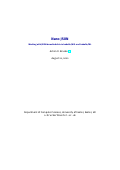Nano JSON: Working with JSON formatted data in Isabelle/HOL and Isabelle/ML
Achim D. Brucker
 JSON (JavaScript Object Notation) is a common format for exchanging data, based on a collection of key/value-pairs (the JSON objects) and lists. Its syntax is inspired by JavaScript with the aim of being easy to read and write for humans and easy to parse and generate for machines. Despite its origin in the JavaScript world, JSON is language-independent and many programming languages support working with JSON-encoded data. This makes JSON an interesting format for exchanging data with Isabelle/HOL. This AFP entry provides a JSON-like import-expert format for both Isabelle/ML and Isabelle/HOL. On the one hand, this AFP entry provides means for Isabelle/HOL users to work with JSON encoded data without the need using Isabelle/ML. On the other and, the provided Isabelle/ML interfaces allow additional extensions or integration into Isabelle extensions written in Isabelle/ML. While format is not fully JSON compliant (e.g., due to limitations in the range of supported Unicode characters), it works in most situations: the provided implementation in Isabelle/ML and its representation in Isabelle/HOL have been used successfully in several projects for exchanging data sets of several hundredths of megabyte between Isabelle and external tools.
JSON (JavaScript Object Notation) is a common format for exchanging data, based on a collection of key/value-pairs (the JSON objects) and lists. Its syntax is inspired by JavaScript with the aim of being easy to read and write for humans and easy to parse and generate for machines. Despite its origin in the JavaScript world, JSON is language-independent and many programming languages support working with JSON-encoded data. This makes JSON an interesting format for exchanging data with Isabelle/HOL. This AFP entry provides a JSON-like import-expert format for both Isabelle/ML and Isabelle/HOL. On the one hand, this AFP entry provides means for Isabelle/HOL users to work with JSON encoded data without the need using Isabelle/ML. On the other and, the provided Isabelle/ML interfaces allow additional extensions or integration into Isabelle extensions written in Isabelle/ML. While format is not fully JSON compliant (e.g., due to limitations in the range of supported Unicode characters), it works in most situations: the provided implementation in Isabelle/ML and its representation in Isabelle/HOL have been used successfully in several projects for exchanging data sets of several hundredths of megabyte between Isabelle and external tools.
Schlüsselwörter:
Kategorien: ,
Dokumente: (Artikel als PDF Datei)
 Bitte zitieren sie diesen Artikel wie folgt:
Bitte zitieren sie diesen Artikel wie folgt:
Achim D. Brucker.
Nano JSON: Working with JSON formatted data in Isabelle/HOL and Isabelle/ML.
In Archive of Formal Proofs, 2022. http://www.isa-afp.org/entries/Nano_JSON.html, Formal proof development
(Artikel als PDF Datei) (BibTeX) (Endnote) (RIS) (Word) (
 )
)
| abstract | = | {JSON (JavaScript Object Notation) is a common format for exchanging data, based on a collection of key/value-pairs (the JSON objects) and lists. Its syntax is inspired by JavaScript with the aim of being easy to read and write for humans and easy to parse and generate for machines. Despite its origin in the JavaScript world, JSON is language-independent and many programming languages support working with JSON-encoded data. This makes JSON an interesting format for exchanging data with Isabelle/HOL. This AFP entry provides a JSON-like import-expert format for both Isabelle/ML and Isabelle/HOL. On the one hand, this AFP entry provides means for Isabelle/HOL users to work with JSON encoded data without the need using Isabelle/ML. On the other and, the provided Isabelle/ML interfaces allow additional extensions or integration into Isabelle extensions written in Isabelle/ML. While format is not fully JSON compliant (e.g., due to limitations in the range of supported Unicode characters), it works in most situations: the provided implementation in Isabelle/ML and its representation in Isabelle/HOL have been used successfully in several projects for exchanging data sets of several hundredths of megabyte between Isabelle and external tools.}, | |
| author | = | {Achim D. Brucker}, | |
| date | = | {2022-07-29}, | |
| issn | = | {2150-914x}, | |
| journal | = | {Archive of Formal Proofs}, | |
| month | = | {jul}, | |
| note | = | {\url{http://www.isa-afp.org/entries/Nano_JSON.html}, Formal proof development}, | |
| = | {https://www.brucker.ch/bibliography/download/2022/brucker-nano-json-2022.pdf}, | ||
| title | = | {Nano JSON: Working with JSON formatted data in Isabelle/HOL and Isabelle/ML}, | |
| url | = | {https://www.brucker.ch/bibliography/abstract/brucker-nano-json-2022}, | |
| year | = | {2022}, |

